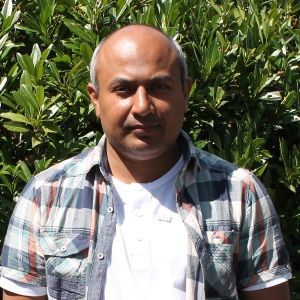Current professional background
I am an Assistant Professor of electrical engineering and the director of the Engineering Laboratory at the Lahore
University of Management Sciences (LUMS) in Pakistan.
Field of research
My field of research is Mobile Robotics, Embedded and Control Systems, Computer Vision, and Remote Sensing.
Purpose of your last research visit
I came to Siegen to work on a new DAAD research project proposal and on a research article related to our recently concluded project “Green Drone: Deforestation and Forest Degradation Estimation using an Unmanned Aerial Vehicle” project, which is a joint project between the University and LUMS funded by the DAAD for two years. For each of these years we planned to undertake a research visit to one another’s institutions. Therefore I was able to come to Siegen for a month each year to work on this project.
In our Green Drone project we use Unmanned Aerial Vehicles (UAV) to survey a forest area, and then using acquired aerial imagery to create a 3D map. Using this map we are able to count trees, estimate their heights, tree-crown diameter and forest density. Together with some statistical parameters of the data we are able to estimate carbon present in the forest. This data is very important for quantifying the environmental impact of the forest, and for carbon credits.
Our cooperation is valuable for both sides because the University of Siegen can provide academic support in creating 3D maps from images, as well as expertise in path planning. Path planning is very important because UAVs are not flying over a flat surface, but over natural terrain, including mountains. What our side was able to offer were algorithms for detecting trees in 3D maps of the forest, as well as our local perspective. Because we are based in Pakistan we are able to meet with government departments and to build a good working relationship with them.
Relation to the University of Siegen and the local host
It started in 2007 when I got a scholarship from my government for a Master’s degree which would then lead to a PhD I chose to come to Germany because I felt it to be more technologically advanced.
My PhD at the University of Siegen was concentrated on cooperative localisation and mapping of heterogeneous mobile robots, such as ground as well as UAVs. In order to navigate in an unknown environment, these robots need environment map, but if the environment is unknown then of course such map does not already exist, therefore, first they need to jointly create a map of the environment. In essence this is like a chicken and egg scenario.
Future projects and Activities
One of the goals for this year’s research visit was for us to submit another joint proposal. If we come across some other opportunities where we could get some joint funding then we would be more than happy to take them in order to make this cooperation sustainable.
Impressions of Siegen
My first winter here did prove to be a little bit challenging for me because I come from a warm climate, but I got used to it. When I came back, after having previously spent six and a half years in Siegen, I felt very comfortable because everything feels so familiar to me, and I was also overjoyed to meet my old friends again.
